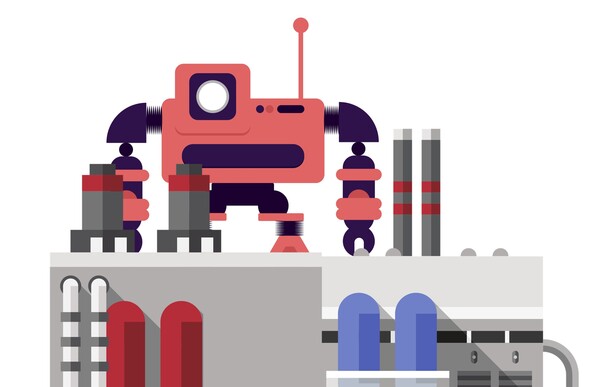Korea Institute of Public Finance reports that automation also creates jobs, not only displacing them

Recently, the Korea Institute of Public Finance(KIPF) reported that automation impacts employment in a more complex way than its naysayers imagine.
Hyundai Mobis, a developer of modern robotics, announced its development of mobile collaborative robots on November 27th.
The mobile collaborative robots employ robust wheels that enable them to transport up to 200 kg of supplies.
In addition, they use cameras and ultrasonic wave-enabled sensors to move around factories without human aid.
Hyundai Mobis is currently arranging a pilot operation of the mobile collaborative robots in its Ulsan electrification plant.
The robots' success at the plant may prompt Hyundai Mobis to distribute them across its factories.
Hyundai Mobis’ development of mobile collaborative robots provides one such case where Korean robotics can perform the traditional tasks of human laborers.
Through such developments, robots have widely and rapidly penetrated Korean labor markets.
A 2019 International Federation of Robotics statistic reported that South Korea deploys 868 robots for every 10,000 employees.
Exceeding the global average by 668%, South Korea has automatized its workforce to an unparalleled extent.
Furthermore, the proportion showcases an increase of 63 percent from its 2015 equivalent.
Such staggering growth over a mere 4 years reveal how robots are penetrating Korean job markets at an expeditious rate.
Many claim that the pervasive and rapid automation of the Korean labor market will raise unemployment rates.
Corresponding to this idea, a 2020 research on robot displacement of human labor predicted that automation might displace up to 22% of all Korean jobs by the mid-2030s.
This percentage represents a sweeping count of approximately 5.5 million employees.
Intellectuals from various fields convened at Basic Income Funding Tax Reform Seminar to counteract unemployment due to automation.
At the seminar, University of Seoul Professor Hoon Park argued that the Korean government must impose various tax measures on robot owners.
"We should levy value-added tax, income tax, consumption tax, property tax, acquisition tax, and local resource facility tax on robot owners with an additional value-added tax if the robots they own are intelligent," he proposed.
According to Professor Park, the proposed taxes will secure jobs for workers against the swelling robotics development by implicitly penalizing automation.
While acknowledging that taxation will slow, if not revert, the automation of labor markets, many economists cast doubts on whether the approach will curb unemployment.
According to their understanding, automation and unemployment manifest a more complex relationship than a simple cause-effect relationship.
Robots displace human employees by performing human labor efficiently and inexpensively.
At the same time, they may create jobs by fostering industries.
In light of this perspective, the Korea Institute of Public Finance(KIPF) reexamined the relationship between automation and unemployment in Korea.
Based on its findings, the institute published the report "The impact of innovations in production technology on the labor market: Focusing on the introduction of robots and smart factories" in June 2022.
On one hand, the report noted that automation supports job growth in the Korean production industry.
It indicated that adding one robot per thousand production employees raised production employment by an average of 0.377% from 2001 to 2018.
On the other hand, the report stated that the net impact of robot exposure on the Korean service industry during the same period was negligible and statistically insignificant.
As a whole, the report illustrated that automation affects employment rates differently across Korean industries.
More specifically, it indicated that robots boost employment in certain industries.
Thus, the study invalidates the common misconception that automation only displaces human labor.
Automation is a double-edged sword that produces jobs in addition to displacing them.
Therefore, it can be said that policymakers should neither hinder nor haste the automation of Korea too soon.

- Hoseok Ahn / Grade 11
- Asia Pacific International School

![THE HERALD STUDENT REPORTERS [US]](/assets/images/logo_student_us.png)
![THE HERALD STUDENT REPORTERS [Canada]](/assets/images/logo_student_ca.png)
